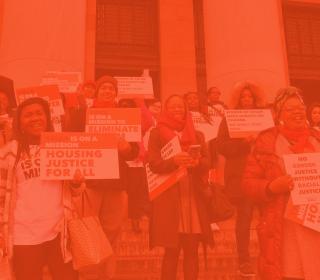Holistic Services

YWCA Sexual Violence Legal Services (SVLS) is a program of YWCA Seattle | King | Snohomish, providing holistic legal service to survivors of sexual assault. It is the only legal program in the state that exclusively serves survivors of sexual assault. “By holistic,” says Legal Director Riddhi Mukhopadhyay, "we mean that if a survivor comes in with one legal issue, we won’t just represent them on only that issue. If there are other legal issues that come up related to the sexual assault, we will represent or assist the survivor in all of those things.” By addressing the whole range of needs of their program participants, SVLS helps stop survivors from falling through the cracks in the legal system, an all-too-common occurrence.
For the attorneys with SVLS, this means providing consultation to program participants, such as helping with the incredibly complicated paperwork, or talking through the legal issues associated with cases. When program participants require direct representation in the courtrooms of King and Snohomish counties, YWCA staff attorneys provide counsel regarding criminal cases, immigration, Title IX, housing, crime victim rights, and obtain sexual assault protection orders. Not all cases need direct representation in court, and in those cases the program will consult with survivors who are trying to understand what their rights are after a sexual assault.
Legal Helpline

Another way that SVLS supports survivors of sexual assault is through their legal helpline, which is available Monday to Friday during business hours. The helpline is available for anyone to call, not just survivors of assault, but also attorneys, survivor advocates, or family members. This is a powerful element of SVLS’s work, as it provides technical assistance to attorneys who have taken on a sexual assault case, but may not know how best to serve their program participant. As Staff Attorney Michelle Lucas pointed out, not all attorneys will serve their program participants in a trauma-informed way, or may not realize the “special barriers that sexual assault victims might face."
The legal helpline raises the awareness of sexual assault and its prevalence in our community. “The existence of the helpline tells survivors this is obviously something that effects a lot of people… this is not uncommon and you are not alone” said Staff Attorney Sara Mooney. It also helps to de-stigmatize sexual assault for survivors and for the attorneys who work with them by educating the legal experts. “They’ll say ‘thank you for listening,’” Riddhi said of callers, noting that many are already blaming themselves for their own sexual assault. Her staff help victims begin to see themselves as survivors and to map out how to bring about legal justice to those actually at fault.
Advocating for changes to legal services in Washington
SVLS's holistic model is unique because they are treating each program participant as a whole person. This helps identify who is most vulnerable and unable to access the legal system without assistance. SVLS has been advocating at the state level to encourage more legal providers to adopt a holistic and trauma-informed approach. Only recently has Washington updated its State Plan for Coordinated Delivery of Civil Legal Services, which is the framework for all legal aid providers, to incorporate the priorities of race equity and holistic services. SVLS was already demonstrating that legal services can be implementing these strategies through the race equity lens in its intake process and with its holistic model.
The conversations now happening at the state level are who is getting represented in court and are the attorneys doing that work reflective of the population they serve? "I'm very proud to have been a part of a program that has always been having these conversations" Riddhi says, when reflecting on the advocacy SVLS has engaged the state in. The successful push for the holistic model across Washington is a great example of how advocacy isn’t just legislation or politics, but is also the direct work within the agencies with power over vulnerable populations.
Sexual Assault Survivors alliance

The Sexual Assault Survivors Alliance (SASA) is a group of attorneys who are trauma informed and who help survivors move through the convoluted and traumatic legal system by giving information in their particular area of focus. Michelle and fellow staff attorney Yvonne Chin founded the group after they both had many highly technical employment law questions from their program participants. Even as attorneys in a holistic program, they will never be as knowledgeable as someone who specializes in that field of law. This problem had occurred multiple times, and they realized they needed a way to address it, so they formed SASA. The alliance offers an easier load for attorneys than taking on a whole case pro bono, as this still supports survivors while giving SASA members predictability in how much time they will need to invest.
The holistic model of SVLS matches the wrap-around services of the entire YWCA, and their commitment to developing strategies that are informed by understanding the trauma that their program participants have undergone is the basis on which all of their work rests. Staff Attorneys are helping survivors seek justice, and raising awareness of the barriers the program participants face within the justice system itself.
Want to read part one of our series on Sexual Assault Awareness Month? Our first post covered the latest developments in the state legislature to improve services and care for sexual assault survivors.

Eric Bronson is the Digital Advocacy and Engagement Manager at YWCA. He manages the Firesteel blog in addition to its social media streams and action initiatives. A graduate of Oberlin College, Eric focuses on the intersection of race and gender within the American political economy.
We tell the stories of those with lived experiences of racism and sexism and invite supporters to take concrete actions to correct the root causes of disparity in our communities.


